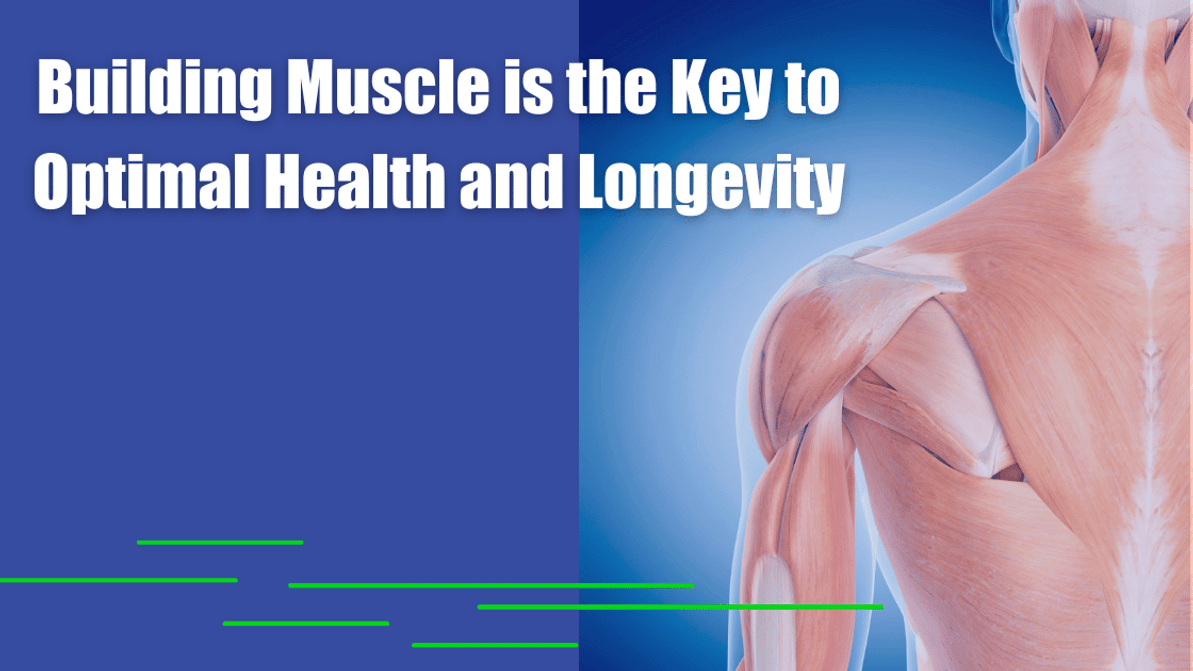Why Building Muscle is the Key to Optimal Health and Longevity
In a world where health and longevity are coveted, the pursuit of well-being has taken center stage. While various lifestyle choices contribute to overall health, one fundamental element often overlooked is the importance of building muscle, which becomes especially crucial as we age.
The Foundation of Strength
Muscles are the engine of our bodies - facilitating movement, supporting posture, and ensuring functionality. Beyond aesthetics, building muscle establishes a robust foundation for strength and endurance, enabling us to tackle life's challenges with vigour. Regular resistance training not only enhances muscle mass but also strengthens bones, joints, and connective tissues.
Metabolic Boost
Muscle is a metabolically active tissue, meaning it requires energy even at rest. As we build and maintain muscle mass, our metabolism receives a significant boost. This increased metabolic rate contributes to more efficient calorie burning, aiding in weight management and reducing the risk of obesity-related diseases.
Balancing Blood Sugar
One of the lesser-known benefits of muscle building lies in its impact on insulin sensitivity. Muscles serve as a storage space for sugar/glucose in the form of glycogen, therefore reducing the amount of glucose remaining in the bloodstream. Improved insulin sensitivity allows our bodies to better regulate blood sugar levels, reducing the risk of type 2 diabetes. Incorporating resistance training into our routines can be a powerful preventive measure against this increasingly prevalent health concern.
Hormonal Harmony
Resistance training triggers the release of hormones crucial for overall health. Growth hormone and testosterone, in particular, play vital roles in muscle development, bone density, and overall well-being. By engaging in regular muscle-building activities, we optimize these hormone levels, fostering a harmonious internal environment.
Longevity and Quality of Life
Numerous studies suggest a strong correlation between muscle mass and longevity. As we age, the natural decline in muscle mass, known as sarcopenia, is associated with increased frailty and a higher risk of chronic diseases and accidents such as falling. By actively engaging in muscle-building exercises, we not only combat the effects of ageing but also enhance our quality of life, ensuring that we can enjoy our later years with vitality and independence.
Practical Tips for Muscle Building
1. Progressive Resistance Training: Gradually increase the intensity of your workouts to challenge your muscles and promote growth.
2. Balanced Nutrition: Ensure an adequate intake of protein as this is essential for muscle repair and growth. Also be sure that you are getting adequate amounts of essential vitamins and minerals by eating a variety of whole foods and supplementing when necessary.
3. Adequate Rest: Muscles need time to recover and grow. Prioritize quality sleep and allow for rest days in your fitness routine.
In conclusion, building muscle is not just about sculpting a toned physique; it is a holistic approach to fostering good health and longevity. Incorporating resistance training into our lifestyles empowers us to take charge of our well-being, unlocking the door to a longer, healthier life. As the saying goes, "Strength is the fountain of youth," and in the case of muscle building, it couldn't be more accurate.
Recent Posts
-
Beat the Winter Blues: A Nutritionist’s Guide to Managing Seasonal Affective Disorder Naturally
As the days get shorter and temperatures drop, many people notice changes in mood, energy, sleep, an …Dec 12, 2025 -
Back to School: Sharpen Focus, Energize Learning
As the school season kicks off, it’s the perfect time to set students up for success—not just with s …Sep 02, 2025 -
Is Apple Cider Vinegar Really Good for You?
Exploring the Benefits of ACV (Featuring Filsingers Organic Apple Cider Vinegar & Suku Vitamins Appl …Jul 18, 2025




